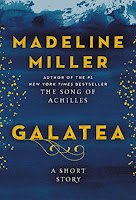Short Story Review: Galatea: A Short Story by Madeline Miller

My Rating: 3.5⭐
Galatea by Madeline Miller is a brief reimagining of the Greek myth of Pygmalion. In the original story (found in Ovid’s Metamorphosis) Pygmalion is a sculptor from Cyprus who falls in love with his ivory sculpture of a beautiful woman. Goddess Aphrodite grants his wish and bestows life on his creation. Pygmalion marries Galatea and they are assumed to live happily ever after. The myth has inspired numerous works of art, literature and productions on stage, on television and in movies. The Pygmalion Effect, a psychological phenomenon that links high expectations to increased productivity is also named after the Greek myth.
“Everyone looked at me, because I was the most beautiful woman in the town. I don’t say this to boast, because there is nothing in it to boast of. It was nothing I did myself.”
Madeline Miller’s feminist reimagining of the myth is dark and disturbing. Narrated from Galatea’s PoV, the story begins with her confined to a hospital bed, her plight a result of a failed effort to escape her controlling and obsessive husband with their daughter Paphos. Her husband visits her in her captivity, expecting her to conform to his wishes, keeping her away from her daughter, and informs her that he is working on a new sculpture of a young girl. Galatea feigns obedience all the while keenly observing her surroundings and planning her next move, ultimately leading to a shocking climax.
“The thing is, I don’t think my husband expected me to be able to talk. I don’t blame him for this exactly, since he had known me only as a statue, pure and beautiful and yielding to his art.”
Madeline Miller’s prose is elegant yet unflinchingly brutal. She turns the story around from a fairy-tale-like myth to the story of a woman trapped in a toxic, abusive relationship with a brutish husband. Miller portrays Pygmalion in an essentially unfavorable light, comparing his disgust for prostitutes and other women he has interacted with and his obsession with perfection and “pure” women who are capable of “blushing” to modern-day “incels”. Galatea’s bitterness, pain and rage are palpable as is her resolve to change the trajectory of her life. Given the short length of this story (the Kindle edition is a little over 50 pages), there isn’t much scope for exploring the characters or the myth in depth but overall this is a compelling read that I believe fans of feminist retellings of Greek myths would enjoy.
Comments
Post a Comment